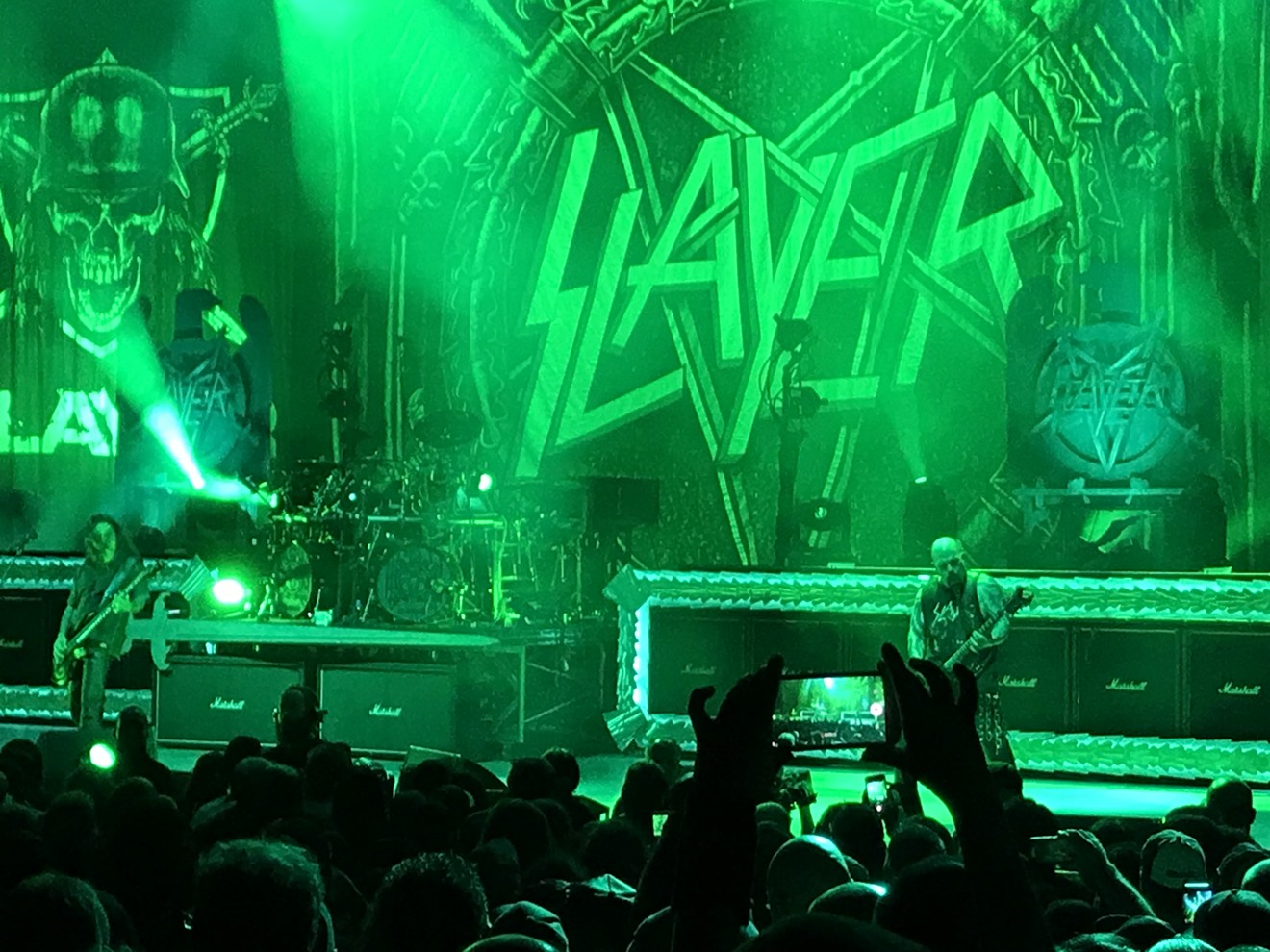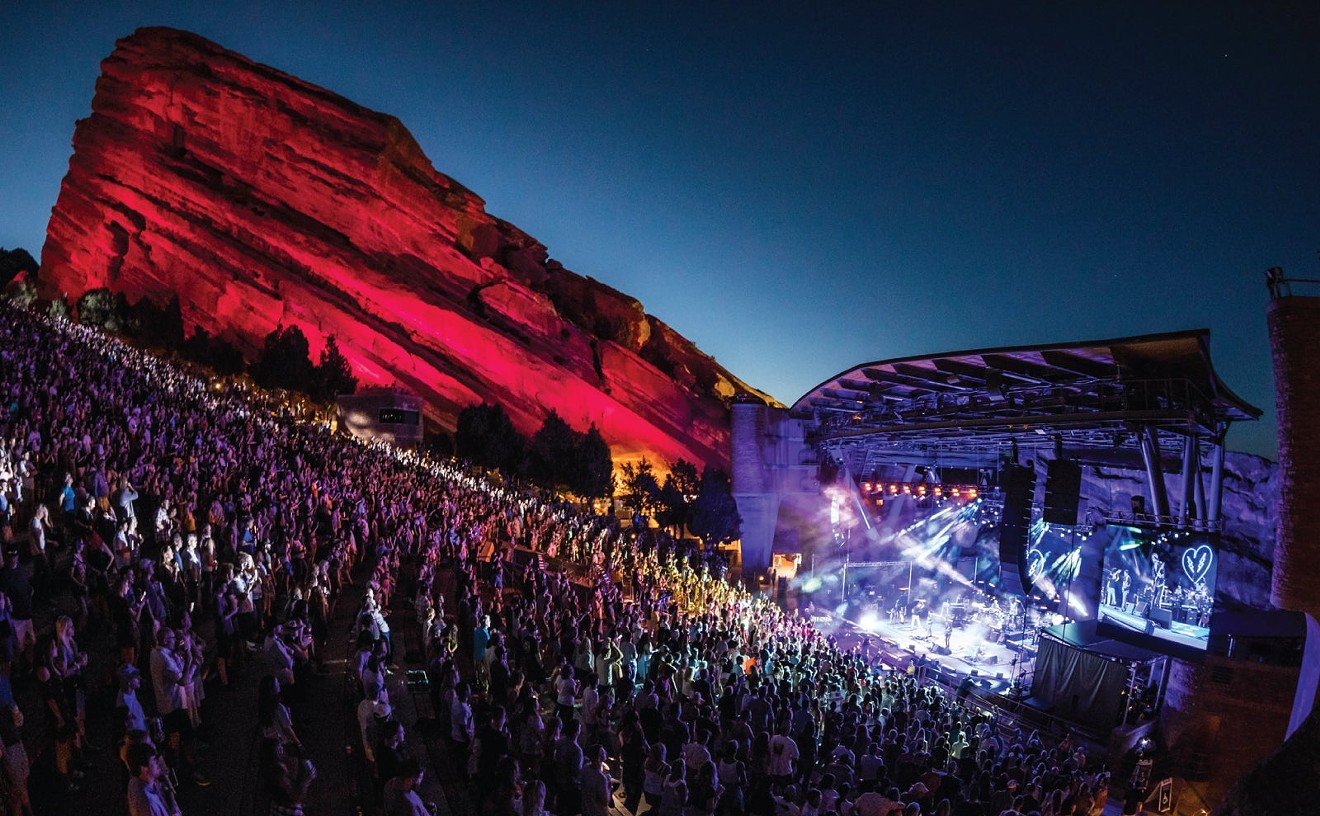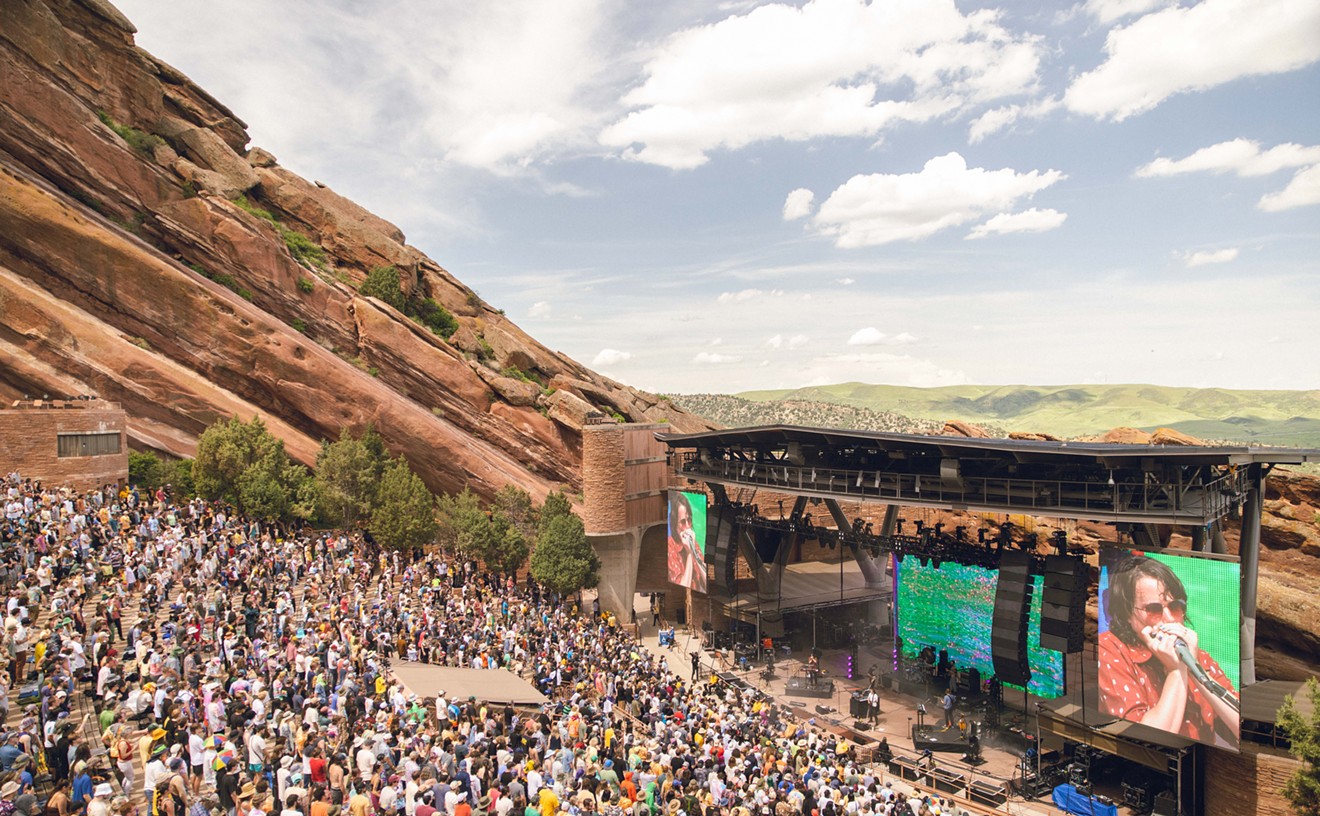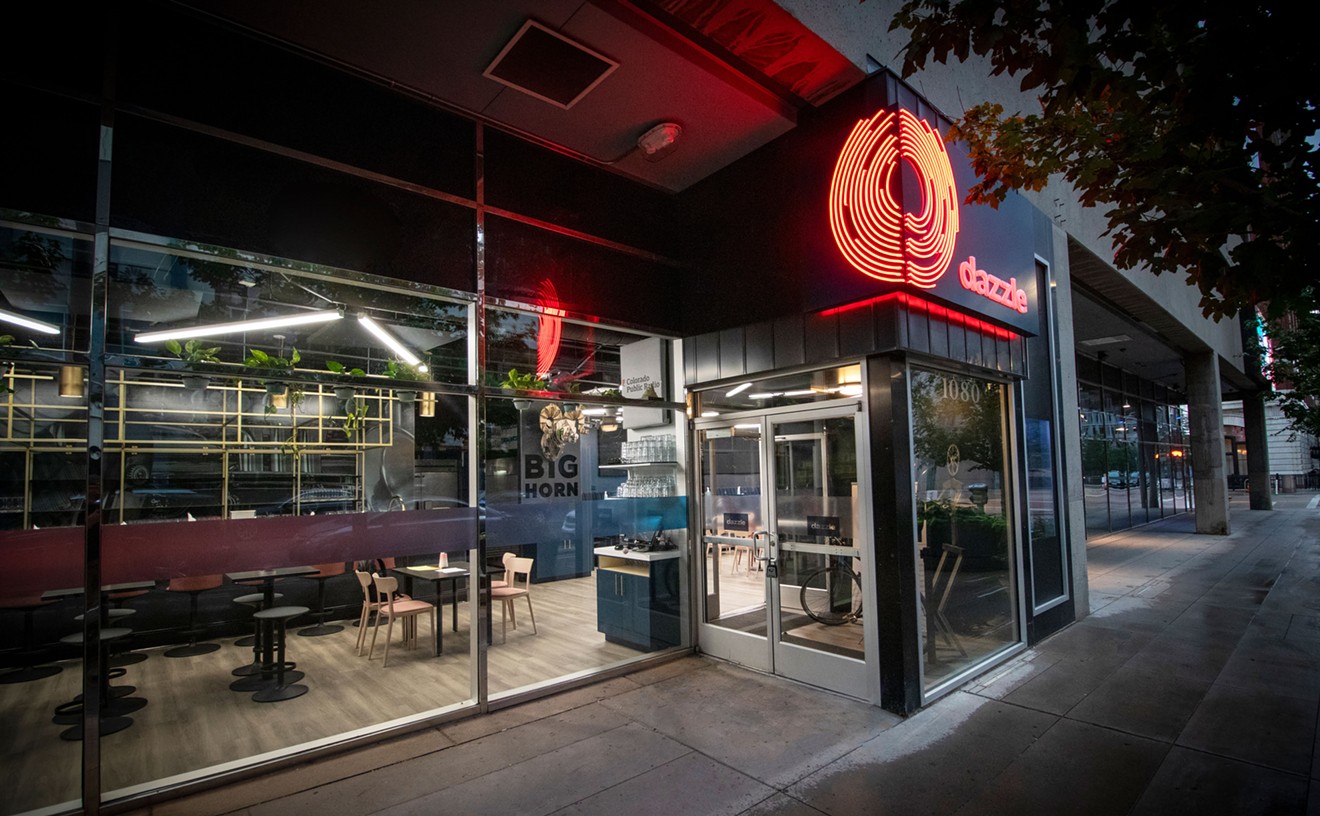From the beginning, there was nothing utopian about Slayer, the band that played its final Denver-area concert at Fiddler's Green on August 18 as part of its End of Days swan-song tour around this burning world.
The thrash-metal outfit formed in 1981, a bleak year. The hippie era's promise of drugs had led to withdrawals and hangovers in the '70s, and visions of peace, poetry and free love had plummeted into a cultural depression that only a dose of Reaganomics could cure – devastating side-effects unlisted, of course.
Leftist political struggles had fizzled in arrests and bombings, hijackings and kidnappings that left hopefuls baffled and broken. Even the DIY promises of punk had been gobbled up by record labels and turned into a moneymaker for the rich, proving there was no limit to what capitalism could pervert into a commodity. And the sexual revolution spun into the void as the first cases of AIDS were discovered. Revolutionaries of the libido zipped up their pants and started weeping; the Christian right bashed and blamed those dying and losing their loved ones. Orgasms became a death sentence.
That was the world in which the thrash-metal pioneers of Slayer came together: a world where even nihilism seemed too hopeful, where Christ hates us all.
Slayer’s impulse was hardly original, but it was potent: Stop making music to glorify hippie hope, leftist utopias, conservative prudishness or God. Glorify Satan, rage and death instead. Why not? They’re winning.
The band’s music merged the pace and fury of punk with the technical riffs and hail-Satan posturing of early metal. It was music to party hard to, trading in promises of heady consciousness with headbanging. Love-your-brother humanism became punch-the-fucker moshing instead. Power trumped peace. Blood rained.
So last night, in the suburbs of Denver, a faded-black-clad crowd of fifty- and sixty-something metalheads and their younger imitators gathered to raise a beer, smoke a joint and salute the band, with devil fingers, one last time.
It’s a different era than the early ’80s. Donald Trump has offered a nationalist utopian promise of his own: Make America Great Again, which has been bolstered by Nazis, Proud Boys and other privileged identity-politics-obsessed mostly white men who view themselves as victims of a multicultural, feminist, LGBTQ society. And in turn, there are black and Latino pop-cultural renaissances that offer a Wakanda-style futurism resurrecting cultural traditions ravaged by colonialism.
All that makes Slayer’s upside-down crosses, bleeding skulls and pentagrams seem more kitschy than menacing. The band offers the same urgency in this moment as rockabilly concerts, swing-dance classes or antiques shopping.
From opening songs that included “Repentless” to its closing number, “Angel of Death,” the band played a fearsome set. The massive Kerry King, bald with a long rope of a goatee, relentlessly banged his head. Frontman Tom Araya raged while singing — goofy as he might have been whenever he addressed the audience. Slender, long-haired guitarist Gary Holt never stopped moving. And drummer Paul Bostaph, hidden behind his massive kit, drove the show, with his drums rigged with pyrotechnics that shot upside-down crosses and zig-zag patterns of flames above the musicians.
While a lot of old metal bands — think the overproduced, radio-friendly rockers in Metallica with their supersized screens, Leni Riefenstahl stage production and Disneyesque showman ways — wouldn’t be able to pull off their acts in a small room (their egos would never fit), the legit thrashers in Slayer could have just as easily been playing the garage at Seventh Circle Music Collective as Fiddler’s Green.
The quality of their performance wasn’t in the visuals — though the nonstop fire and epic skull-and-pentagram iconic metal backdrops did add to the concert. Rather, it lay in the music and the bandmembers' proficiency with their instruments.
The best metal shows have always been the underground ones, and a band like Slayer that offers that sort of intimacy to 17,000 people is doing a lot right.
But not everything. Slayer's spirit of rebellion has always resulted in unfocused political frustration minus any theory or concrete history to anchor it to — the sort of load an anarchist, a Dem, a GOPer and a fascist alike could swallow in an empty sort of way.
With Slayer, there’s gunfire but no target, screaming about governments but no government being screamed at.
As guitarist and founding member King told Westword last year, "If I do a political song, it's generally extremely general... Of course, it's about my government, because that's the government I know. But I also like to make it very vague so people can say, in any given country, 'Yeah. I hate my government, too. He wrote this song for me.' I like it to be like that, so it's not just Americans getting something out of it. It's Europe. It's Australia. It's Japan. Anybody who wants to get into it can get behind it."
But these days, when authoritarian nationalism has become status quo, vagaries just don't cut it. This moment demands specifics. In the words of the not-so-great painter George W. Bush, "You're either with us or against us." Pick a side.
Slayer, whose members squabbled in 2016 over a photo of Trump giving devil horns with the band that frontman Tom Araya posted to the group's social-media feed, may not have a cohesive enough politic to do so.
I can’t say whether an inability to take aim is why Slayer’s calling it quits — the members weren’t available for interviews this round. I can't even say if the band really is calling it quits, because other acts have made that claim and then toured more.
But when Araya stood on stage and thanked 17,000 people, and when King raised his fists above his head and let out a Viking-style war cry at the end of the show, I admit: I shed a tear. And I’m sure I wasn’t alone. No doubt Slayer is one of the giants of our age, and saying goodbye is hard.
Despite phony farewell tours being a staple of the music industry, I believe this will be the last time that Denver will be seeing the band: This tour will be it. After all, Slayer doesn’t sham audiences with phony encores. When the show’s over, it’s over.
The “Angel of Death” comes...and goodnight.
[
{
"name": "Air - MediumRectangle - Inline Content - Mobile Display Size",
"component": "12017618",
"insertPoint": "2",
"requiredCountToDisplay": "2"
},{
"name": "Editor Picks",
"component": "17242653",
"insertPoint": "4",
"requiredCountToDisplay": "1"
},{
"name": "Inline Links",
"component": "18838239",
"insertPoint": "8th",
"startingPoint": 8,
"requiredCountToDisplay": "7",
"maxInsertions": 25
},{
"name": "Air - MediumRectangle - Combo - Inline Content",
"component": "17261320",
"insertPoint": "8th",
"startingPoint": 8,
"requiredCountToDisplay": "7",
"maxInsertions": 25
},{
"name": "Inline Links",
"component": "18838239",
"insertPoint": "8th",
"startingPoint": 12,
"requiredCountToDisplay": "11",
"maxInsertions": 25
},{
"name": "Air - Leaderboard Tower - Combo - Inline Content",
"component": "17261321",
"insertPoint": "8th",
"startingPoint": 12,
"requiredCountToDisplay": "11",
"maxInsertions": 25
}
]















